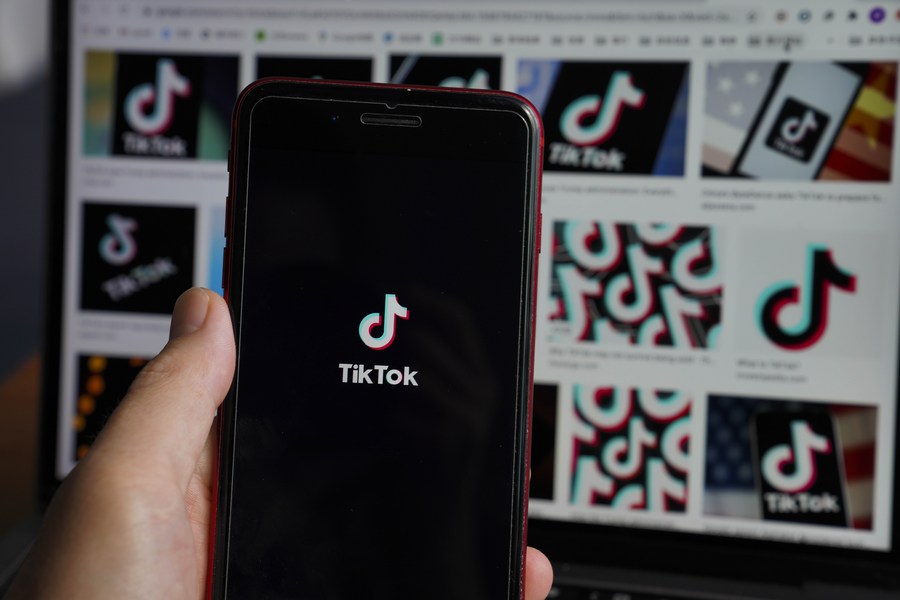US TikTok smears driven by politically opportunistic hysteria
- ?By Tom Fowdy
 0 Comment(s)
0 Comment(s) Print
Print E-mail China.org.cn, April 20, 2023
E-mail China.org.cn, April 20, 2023

The logo of TikTok is seen on a smartphone screen in New York, the United States, Aug. 30, 2020. [Photo/Xinhua]
The United States is in a state of mass hysteria pertaining to the popular social media application TikTok. The application, which has become a phenomenon and the single most downloaded app worldwide, even surpassing Google as the single most visited website, is owned by the Chinese company ByteDance, but incorporated in the Cayman Islands. Because of its Chinese origins, the application has recently come under fire by American politicians and the mainstream media, who have accused it, baselessly, of sharing data with the Chinese government and branding it as a "national security threat."
This has led to a growing movement of politicians and citizens looking to restrict or ban the app, with its CEO subject to a dramatized congressional grilling last month, while the U.S. and state governments have banned it on official devices, a move soon copycatted by allies. Then, the U.S. state of Montana subsequently became the first state to try and impose a ban on the app outright, although it is unclear how such a ban could ever be enforced, let alone lawful in its constitutional nature. The Biden administration, according to the mainstream media, has also pushed ByteDance to forcibly divest on the threat of a ban.
This can only be described as a politically motivated witch hunt, defined as political action that ramps up mass hysteria concerning a target with no evidence to merit the claim whatsoever. It is common for U.S. politicians, backed by the media, to pursue their goals by deliberately provoking fear and mass paranoia in the view to smearing, attacking, and making outrageous accusations about their political rivals, both at home and abroad. This dynamic has been special in the U.S.'s 20th-century foreign policy. The U.S. government has long cultivated and weaponized fear and paranoia regarding a foreign adversary in order to build support for its goals, framing every situation as a life or death, zero-sum struggle between democracy and authoritarianism, or "good vs. evil."
In doing so, such paranoia is never pursued rationally, nor is it done with any consideration of the actual facts. This was most explicitly manifested in the era of McCarthyism, which was used to manufacture consent for the Cold War.
Thus, in setting themselves on the path of "strategic competition" against China, U.S. politicians are stirring feelings of paranoia, hysteria, and fear-mongering pertaining to all things from the country, no matter how benign and contrary to evidence they may be. Successful Chinese companies and products are routinely accused of engaging in espionage, almost always on a guilt-by-association basis. These smears are often motivated by clear-cut opportunism, usually with the goal of undermining the market access of the given product or service, such as, for example, with Huawei 5G. The United States' modus operandi is that if they deem that they cannot compete with a given enterprise, they seek to discredit it or undermine it.
TikTok is being targeted because it is the first-ever Chinese-made social media application to become a world leader. Its success is unprecedented, and it subsequently challenges the monopoly that the United States has over global social media and the internet at large. The U.S. has long made it clear that its goal is to maintain hegemony over what they describe as "the future of the internet," and as such, TikTok has become the subject of a concerted mass hysteria campaign driven by the premise of guilt by association; if it is Chinese, the thinking goes, then it is guilty by default.
The campaign against the application, however, has woken many young people up to the sheer extent of the deranged behavior of American politicians, who claim to be supporting freedom of expression and speech but actually want to suppress an application, not because it has done anything wrong or violated any laws, but purely upon the premise of its national origin. The political consequences of such a move would be disastrous, especially for the Biden administration, despite the fact that they believe riding on the tidal wave of anti-China hysteria can bring them plaudits. Rather, these moves only serve to demonstrate the fundamental irrationality, dishonesty, and crooked nature of the U.S. political system.
Tom Fowdy is a British political and international relations analyst and a graduate of Durham and Oxford universities. For more information please visit:
http://www.formacion-profesional-a-distancia.com/opinion/TomFowdy.htm
Opinion articles reflect the views of their authors, not necessarily those of China.org.cn.
If you would like to contribute, please contact us at opinion@china.org.cn.





